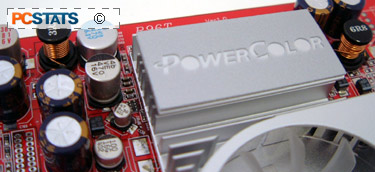PowerColor Radeon 9600XT Ultra Videocard Review
I always cringe when I hear gamers talking about getting a new
Dell, HP
or Compaq.... sure they get a lot of "fluff" with those PC's, but I suspect they'll
ultimately be disappointed when comes time to play the latest and greatest DX9 games. It's not
really their fault though, it can be confusing shopping for your first "killer gaming
rig," and brand names with their slick advertising are an easy route
to go.
When the time comes to upgrade their brand name PC for more kick, I know
I'll get an e-mail about what new videocard to buy. After all, what fun is a computer if
you have to game through a choppy session of UT2004, Call of Duty or the new FarCry demo?
If their system is state of the art, I might recommend a videocard like the Radeon 9800
Pro.
If their system is more mainstream, a
Geforce FX5900XT, FX5700 Ultra or perhaps even a Radeon 9600XT might just be what the doctor
ordered... Which leads us to the PowerColor Radeon 9600XT Ultra videocard we're pumping
the pixels through in this review!
Let's take a walk on the mainstream side of gaming, and see how the
PowerColor compares to the competition when you're back is up against the wall, and you need
70FPS to get out alive!
The
PowerColor Radeon 9600XT Ultra has 128MB of 2.5ns Samsung BGA DDR RAM backing
the GPU up. The card supports TV-Output, and PowerColor include
all the necessary cables, including; an S-Video-to-S-Video cable and an
S-Video-to-Composite converter. If you want to take advantage of the card's dual
monitor capability, they also toss in a DVI-to-analog adaptor. The software
package consists of WinDVD 4, a six game demo CD, Big Mutha Truck and a the
full version of Tomb Raider TAOD. Cool!
It
shouldn't be any surprise that the PowerColor Radeon 9600XT is based on the ATI
reference design - virtually all Radeon's are. PowerColor have slapped on
a custom extruded aluminum cooler, and while it makes allowances
for cooling the front memory chips, they seem to have forgotten all about the
memory on the back of the card.... or perhaps it really wasn't necessary to slap
on a heatsink there. Under power, the fan on the 9600XT Ultra lights
up bright red, which certainly adds a bit of flair. It runs pretty
quiet too.
Considerately, PowerColor include all the necessary cables you'll need to use
the TV-Out feature. It might seem like a minor detail to mention, but not
every videocard comes like this, and it's a real let down when you have
to go to your local electronics store to buy the proper cable.
Curiously, when I started testing
out the PowerColor Radeon 9600XT Ultra at first, I noticed that it consistently scored
higher than the reference 9600XT videocard in our benchmark set. I
was a bit puzzled, but after a bit of snooping around, it seems that PowerColor clock
the memory at 337 MHz instead of 300 MHz (which is the stock
speed for the 9600XT).
The slightly faster memory guarantees that PowerColor's Radeon 9600XT
Ultra is going to come in faster than the rest of the competition.
Very nice.
Overclocking the Powercolor
9600XT
 For the overclocking
tests, I started with the core first, which is clocked at 500 MHz by default. As the core speed was
increased past the 550 MHz mark, the little RV360 core didn't even break a sweat. It maxed
out at a very nice speed of 578 MHz, without any sign of visual
artifacts.
For the overclocking
tests, I started with the core first, which is clocked at 500 MHz by default. As the core speed was
increased past the 550 MHz mark, the little RV360 core didn't even break a sweat. It maxed
out at a very nice speed of 578 MHz, without any sign of visual
artifacts.
It's been touch and go overclocking the memory on Radeon 9600XT/Pro
cards in the past, but the PowerColor Radeon 9600XT Ultra
is something special. First off, the card uses Samsung K4D263238E-GC25 BGA DRAM modules - faster DRAM than
that found on the Radeon 9700 and 9800 Pro based models! In fact, according
to Samsung the memory should be capable all the way up to 400 MHz; great news for
overclockers!
Without much surprise, the memory ran flawlessly all the
way up to a maximum of 408 MHz... still a heck of a lot faster than any
other 9600XT we've seen!
Surprisingly, the core and memory did not overclock well
together, causing the card to lock up in 3D applications. Knowing that the 9600XT care is pretty much memory bandwidth limited, I decided
to only lower the core speed before trying again. Unfortunately I had to lower
it all the way down to 542 MHz for things to sort themselves out. Anything higher and the
card was unable to finish the benchmarks. Still, a speed of 542 MHz core and 408
MHz memory got us some pretty impressive performance figures for what is otherwise a nice
mainstream card.
Up next, the benchmarks you've
been awaiting!

